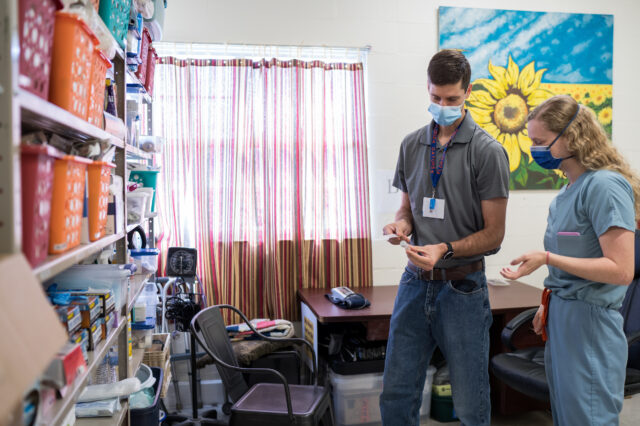UF College of Medicine team works to protect homeless population during COVID-19 pandemic

A team of volunteer University of Florida College of Medicine students, faculty and staff are working to help protect one of Gainesville’s most underserved and medically vulnerable communities from the coronavirus COVID-19.
From March 30 through April 1, 145 individuals residing at GRACE Marketplace were screened and tested for COVID-19. GRACE Marketplace is a 25-acre campus in northeast Gainesville that provides shelter, services and permanent housing solutions for Gainesville’s homeless population.
The initial testing produced no positive cases, and both the UF Mobile Outreach Clinic and the Alachua County Medical Reserve Corps will continue to provide free medical services every Monday and Friday, including the capability to test both residents and staff of GRACE as ongoing needs arise.Grant Harrell, M.D., medical director of the UF Mobile Outreach Clinic who led the effort, said UF medical students continue to volunteer on outreach teams as on-the-ground support staff, making contact with Gainesville area homeless individuals, assessing their medical needs and then connecting them to the telehealth support they may require.
“It is very encouraging to see how seamlessly we can work together and to witness the volunteerism of the medical students and the Mobile Outreach Clinic staff,’’ said Harrell, an assistant professor in the UF College of Medicine’s department of community health and family medicine and a physician at UF Health Family Medicine – Old Town. “It proves how we can come together as different facets of the health care system to work toward the goal of serving vulnerable populations, especially the homeless community.”
Jon DeCarmine, executive director of GRACE Marketplace, said the testing UF Health continues to conduct creates a lasting impact for this medically vulnerable population, who often cannot maintain the isolation recommended for social distancing practices. Following Centers for Disease Control and Prevention guidelines, the GRACE campus has observed a voluntary quarantine since mid-March and has created isolation units off campus for those who test positive for COVID-19.
“Homeless people are particularly vulnerable to this and a wide variety of other illnesses. About half of the people in our shelter are over 50, with a variety of underlying health issues,” DeCarmine said. “By default, people without a home of their own tend to live in congregate settings that can make it difficult to maintain appropriate distance from other people.”
The initial testing process, Harrell said, was a “wonderful combined effort” thanks to the UF Emerging Pathogens Institute, whose research study on vulnerable populations allowed for widespread COVID-19 testing at GRACE.
“To be able to develop appropriate public health interventions for COVID-19, it is important to understand how the virus is transmitted within the community and, in particular, within vulnerable populations such as the homeless,” said Glenn Morris Jr., Ph.D., director of the UF Emerging Pathogens Institute. “Testing for COVID-19 at GRACE Marketplace lets us optimize care for each of the people tested, while also helping us develop strategies to minimize transmission of COVID-19 within this group.”
Harrell said the experience the medical students are gaining will help create thoughtful, compassionate medical practitioners who consider not just a patient’s symptoms but also their social determinants of health.
“This is a way of introducing students to the realities of how social factors create unique health challenges. The more we involve students in seeing how health care works in these vulnerable populations, the more these lessons hit home,” he said. “This kind of education leaves indelible impressions on students, and it’s very hard to recreate that in lecture halls.”
Third-year medical student Cynthia Guerin worked to gather medical histories and gain informed consent documentation from GRACE residents who were tested. Guerin, who has previously volunteered at GRACE with the UF Mobile Outreach Clinic, said the experience made her appreciate the things many take for granted each day and showed her the value of true community.
“As scared and stressed as those of us who have stable housing are, this community is even more so. Many of them do not have adequate health insurance, meaning they would not have been otherwise able to get tested. And, if they were infected, it would be very hard for them to get the care they needed,” Guerin said. “We’re all in this together. We need to protect all members of our community to keep the whole community safe.”